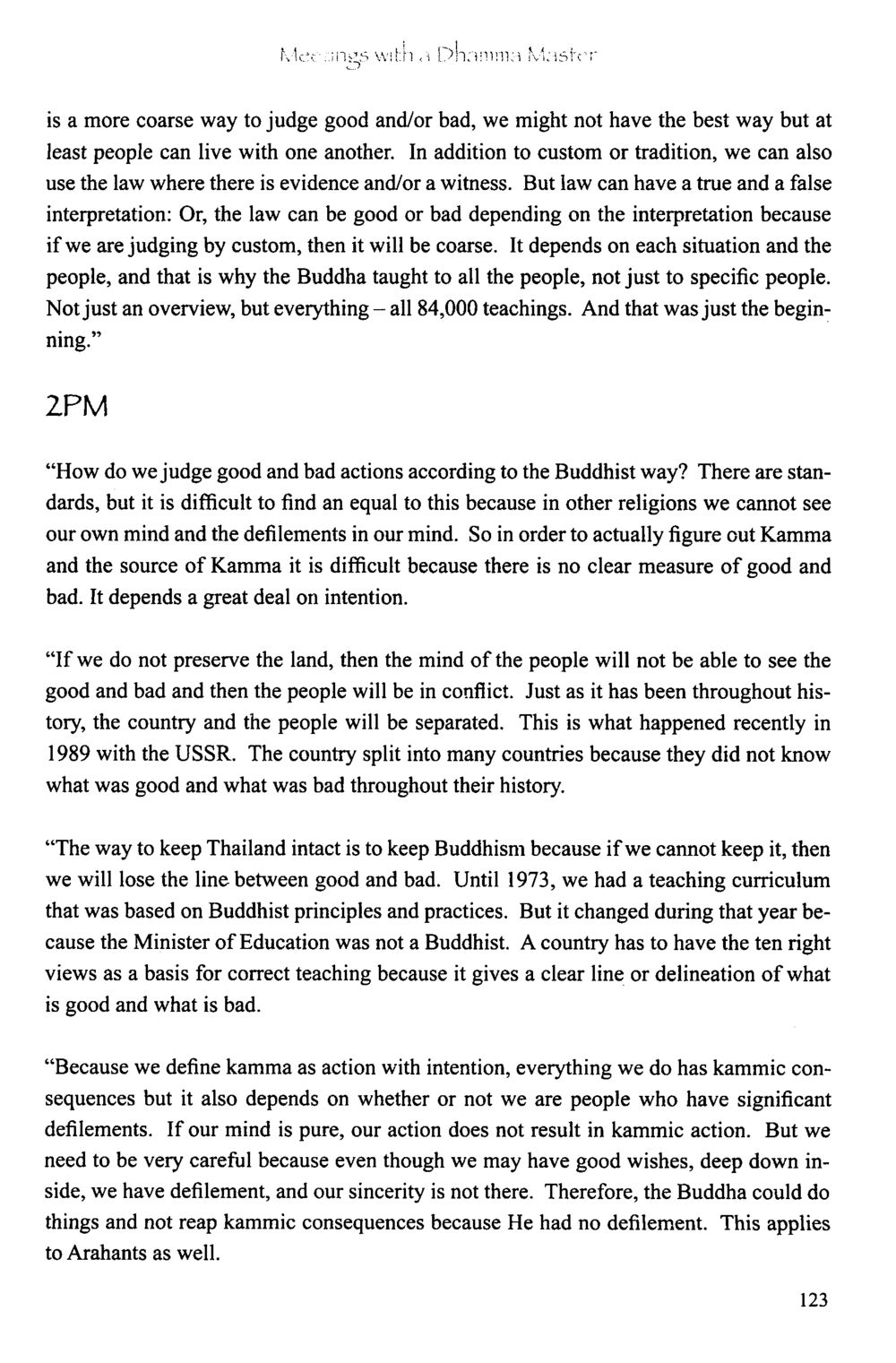Meetings with a Dhamma Master : หน้า 124/164
The Meeting with a Dhamma Master : หน้า 124/164 A discussion on the Buddhist perspective of good and bad actions, focusing on intention and the role of Kamma.
0 ครั้ง

สรุปเนื้อหา
The text explores how good and bad actions are judged in Buddhism, emphasizing the importance of intention in determining Kamma. It reflects on the historical context of societal divisions due to misunderstandings of morality. The discussion highlights the necessity of preserving Buddhist teachings to maintain clarity between good and bad, stressing that a pure mind leads to non-kammic actions. The teachings of the Buddha are positioned as a solution to moral ambiguities.
หัวข้อประเด็น
-Buddhist perspective on morality
-Importance of intention in Kamma
-Historical context of societal divisions
-Preservation of Buddhist principles
-Role of mind purity in actions
ข้อความต้นฉบับในหน้า
Meetings with a Dhamma Master
is a more coarse way to judge good and/or bad, we might not have the best way but at least people can live with one another. In addition to custom or tradition, we can also use the law where there is evidence and/or a witness. But law can have a true and a false interpretation: Or, the law can be good or bad depending on the interpretation because if we are judging by custom, then it will be coarse. It depends on each situation and the people, and that is why the Buddha taught to all the people, not just to specific people. Not just an overview, but everything - all 84,000 teachings. And that was just the beginning.
2PM
“How do we judge good and bad actions according to the Buddhist way? There are standards, but it is difficult to find an equal to this because in other religions we cannot see our own mind and the defilements in our mind. So in order to actually figure out Kamma and the source of Kamma it is difficult because there is no clear measure of good and bad. It depends a great deal on intention.
If we do not preserve the land, then the mind of the people will not be able to see the good and bad and then the people will be in conflict. Just as it has been throughout history, the country and the people will be separated. This is what happened recently in 1989 with the USSR. The country split into many countries because they did not know what was good and what was bad throughout their history.
The way to keep Thailand intact is to keep Buddhism because if we cannot keep it, then we will lose the line between good and bad. Until 1973, we had a teaching curriculum that was based on Buddhist principles and practices. But it changed during that year because the Minister of Education was not a Buddhist. A country has to have the ten right views as a basis for correct teaching because it gives a clear line or delineation of what is good and what is bad.
Because we define kamma as action with intention, everything we do has kammic consequences but it also depends on whether or not we are people who have significant defilements. If our mind is pure, our action does not result in kammic action. But we need to be very careful because even though we may have good wishes, deep down inside, we have defilement, and our sincerity is not there. Therefore, the Buddha could do things and not reap kammic consequences because He had no defilement. This applies to Arahants as well.
หน้าหนังสือทั้งหมด

1

2

3

4

5

6

7

8

9

10

11

12

13

14

15

16

17

18

19

20

21

22

23

24

25

26

27

28

29

30

31

32

33

34

35

36

37

38

39

40

41

42

43

44

45

46

47

48

49

50

51

52

53

54

55

56

57

58

59

60

61

62

63

64

65

66

67

68

69

70

71

72

73

74

75

76

77

78

79

80

81

82

83

84

85

86

87

88

89

90

91

92

93

94

95

96

97

98

99

100

101

102

103

104

105

106

107

108

109

110

111

112

113

114

115

116

117

118

119

120

121

122

123

124

125

126

127

128

129

130

131

132

133

134

135

136

137

138

139

140

141

142

143

144

145

146

147

148

149

150

151

152

153

154

155

156

157

158

159

160

161

162

163

164
หนังสือที่เกี่ยวข้อง
Load More
